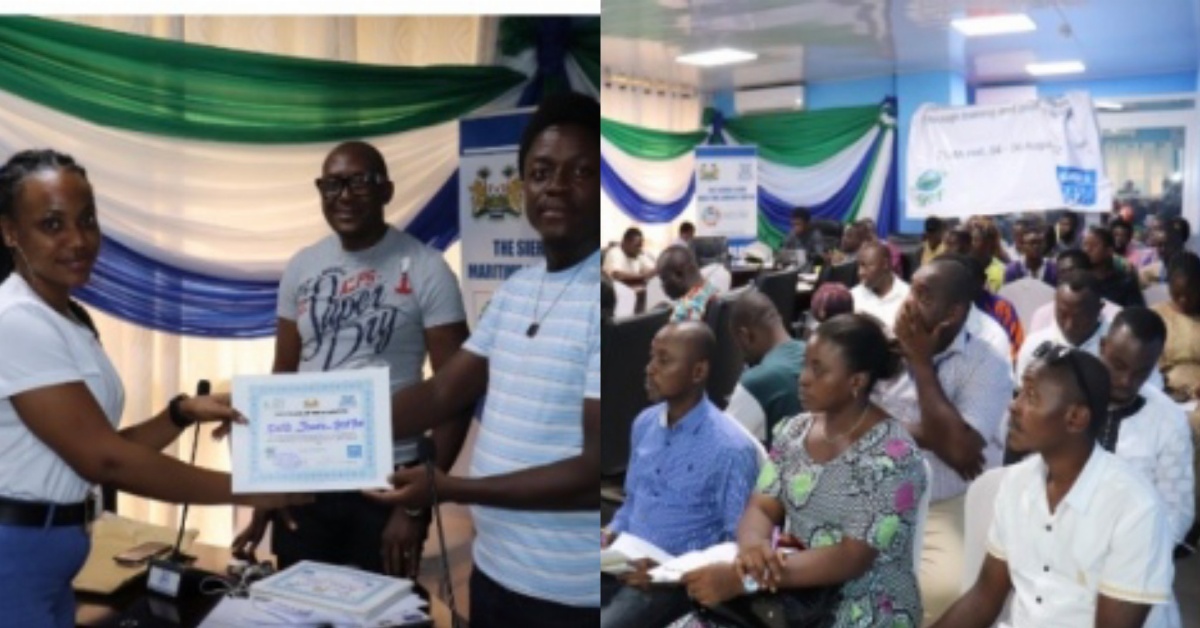In what has been described as sustained efforts to safeguard lives, goods and services along Sierra Leone’s Ocean, rivers and coastal zones, the Sierra Leone Meteorological Agency (SLMET) in collaboration with the Sierra Leone Maritime Administration (SLMA), with support from the United Nations Development Program (UNDP) has ended a three days training on “strengthening Sierra Leone’s Coastal Guard Communication for climate Early Warning Services dissemination through training and distribution of Very High Frequency (VHF) Marine Radios” by UNDP to both institutions.
The training targeted over 50 participants including members of the Media, Maritime Radio Operators, SLMET Forecasters, Observers, etc.
Speaking at the three-day engagement held at the Conference Room of SLMA, Government Wharf in central Freetown, the Deputy Director-General and Head of Operations of SLMET, Gabriel Kpaka said, the training forms part of the UNDP Coastal Risk Management Project with funding from the Global Environment Facility (GEF) with key agencies such as SLMET, Tourism, Maritime and EPA being implementing partners.
Mr. Kpaka further commended the UNDP for helping to rebuild the technical and human capacities of the Agencies within the grip of the coastal risk management project.
He said with the help of UNDP, SLMET has over the years revamped its Marine and weather infrastructure across the country, but added that more needs to be done.
He rounded up his statement by soliciting and enlisting the support of the UNDP to have more marine stations and refresher training with SLMA, build up community volunteers on marine efforts, and strengthen the dissemination of marine weather information.
On his part, Director of Safety and Security at the SLMA, Ibrahim Wurie who stood in the stead of the Acting Executive Director- Sama Gamanga, expressed his appreciation for the role UNDP has played within the Maritime sector, adding that the training and distribution of the Marine radios is a continuation of the good job the Program has been doing over the years. He cited the rehabilitation of three search and rescue vessels by the United Nations Development Program in February 2021 as part of the UNDP’s collaborative effort with the Government of Sierra Leone through SLMA in strengthening maritime security and governance in the country.
With its vast coastline of about 406 Km, Sierra Leone remains one of the countries in the Gulf of Guinea with the least capacity to address maritime security and governance challenges, hence the UNDP’s intervention in enhancing the core operations of the Administration.

Tanzila Watta Sankoh Team Leader, Sustainable Growth Cluster – UNDP while making her statement on the need for the training and the distribution of the Very High-Frequency Marine Radios, said that the Early Warning component in respect of marine efforts, supported over the last four years by the UNDP, covers Hamilton, Lakka, Conakry Dee, Shenge, Tombo and Turtle Island communities respectively. She furthered that it is no news that coastal communities are challenged with many risks and as such, it is but fitting that efforts are made to help them adapt to the many challenges they continue to face.
Mrs. Sankoh said the dissemination of Early Warning information on daily marine Forecasts is key to saving lives.
“Early Warning Services including Marine information can help coastal dwellers to make firm decisions on sea navigation that is, when to stay off the seas when it is high tide and when to use the sea when it’s low, thereby helping them keep safe within the coastal communities”, she emphasized.
The UNDP Rep also informed of the plans to get additional Mobile phones to coastal dwellers which can help them have access to marine information produced by SLMET. She also intimated on the need for fish processing platforms and storage to help in the housing of fish harvest, something she believes is lacking in most fishing communities.
Mrs. Sankoh ended up encouraging the participants within SLMA and SLMET to take advantage of the training and ensure the effective and efficient use of the VHF Marine radios for their intended purpose.
Given the above, it is worthy to note that in line with Policy Cluster 2 of Sierra Leone’s Medium-Term National Development Plan (MTNDP) 2019-2023, the UNDP Country Office is supporting activities that try to build the capacity of SLMA for effective monitoring of the Sierra Leone waters; including the development of the country’s maritime legislative framework and invest in collaborative efforts aimed at strengthening Early Warning systems and marine information dissemination that addresses the flow of information geared towards safeguarding lives, goods, and services.
The training was climaxed by distribution of certificates, handing over, demonstration, and application of the VHF Marine Radios to both the Sierra Leone Maritime Administration and Sierra Leone Meteorological Agency.




 Post a comment
Post a comment









